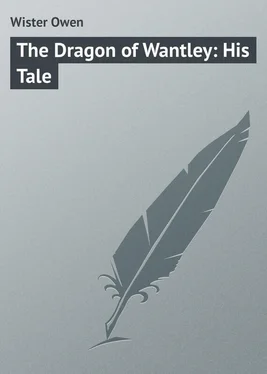Owen Wister - The Dragon of Wantley - His Tale
Здесь есть возможность читать онлайн «Owen Wister - The Dragon of Wantley - His Tale» — ознакомительный отрывок электронной книги совершенно бесплатно, а после прочтения отрывка купить полную версию. В некоторых случаях можно слушать аудио, скачать через торрент в формате fb2 и присутствует краткое содержание. Жанр: foreign_prose, foreign_language, на английском языке. Описание произведения, (предисловие) а так же отзывы посетителей доступны на портале библиотеки ЛибКат.
- Название:The Dragon of Wantley: His Tale
- Автор:
- Жанр:
- Год:неизвестен
- ISBN:нет данных
- Рейтинг книги:4 / 5. Голосов: 1
-
Избранное:Добавить в избранное
- Отзывы:
-
Ваша оценка:
- 80
- 1
- 2
- 3
- 4
- 5
The Dragon of Wantley: His Tale: краткое содержание, описание и аннотация
Предлагаем к чтению аннотацию, описание, краткое содержание или предисловие (зависит от того, что написал сам автор книги «The Dragon of Wantley: His Tale»). Если вы не нашли необходимую информацию о книге — напишите в комментариях, мы постараемся отыскать её.
The Dragon of Wantley: His Tale — читать онлайн ознакомительный отрывок
Ниже представлен текст книги, разбитый по страницам. Система сохранения места последней прочитанной страницы, позволяет с удобством читать онлайн бесплатно книгу «The Dragon of Wantley: His Tale», без необходимости каждый раз заново искать на чём Вы остановились. Поставьте закладку, и сможете в любой момент перейти на страницу, на которой закончили чтение.
Интервал:
Закладка:
Wister Owen
The Dragon of Wantley: His Tale
TO
MY ANCIENT PLAYMATES IN APPIAN
WAY CAMBRIDGE THIS LIKELY
STORY IS DEDICATED FOR REASONS
BEST KNOWN TO THEMSELVES
Preface
When Betsinda held the Rose
And the Ring decked Giglio’s finger
Thackeray! ’twas sport to linger
With thy wise, gay-hearted prose.
Books were merry, goodness knows!
When Betsinda held the Rose.
Who but foggy drudglings doze
While Rob Gilpin toasts thy witches,
While the Ghost waylays thy breeches,
Ingoldsby? Such tales as those
Exorcised our peevish woes
When Betsinda held the Rose.
Realism, thou specious pose!
Haply it is good we met thee;
But, passed by, we’ll scarce regret thee;
For we love the light that glows
Where Queen Fancy’s pageant goes,
And Betsinda holds the Rose.
Shall we dare it? Then let’s close
Doors to-night on things statistic,
Seek the hearth in circle mystic,
Till the conjured fire-light shows
Where Youth’s bubbling Fountain flows,
And Betsinda holds the Rose.
Preface to the second edition
We two – the author and his illustrator – did not know what we had done until the newspapers told us. But the press has explained it in the following poised and consistent criticism:
“Too many suggestions of profanity.”
– Congregationalist , Boston, 8 Dec. ’92.“It ought to be the delight of the nursery.”
– National Tribune , Washington, 22 Dec. ’92.“Grotesque and horrible.”
– Zion’s Herald , Boston, 21 Dec. ’92.“Some excellent moral lessons.”
– Citizen , Brooklyn, 27 Nov. ’92.“If it has any lesson to teach, we have been unable to find it.”
– Independent , New York, 10 Nov. ’92.“The story is a familiar one.”
– Detroit Free Press , 28 Nov. ’92.“Refreshingly novel.”
– Cincinnati Commercial Gazette , 17 Dec. ’92.“It is a burlesque.”
– Atlantic Monthly , Dec. ’92.“All those who love lessons drawn from life will enjoy this book.”
– Christian Advocate , Cincinnati, 2 Nov. ’92.“The style of this production is difficult to define.”
– Court Journal , London, 26 Nov. ’92.“One wonders why writer and artist should put so much labor on a production which seems to have so little reason for existence.”
– Herald and Presbyterian , Cincinnati.Now the public knows exactly what sort of book this is, and we cannot be held responsible.
CHAPTER I.
How Sir Godfrey came to lose his Temper
There was something wrong in the cellar at Wantley Manor. Little Whelpdale knew it, for he was Buttons, and Buttons always knows what is being done with the wine, though he may look as if he did not. And old Popham knew it, too. He was Butler, and responsible to Sir Godfrey for all the brandy, and ale, and cider, and mead, and canary, and other strong waters there were in the house.
Now, Sir Godfrey Disseisin, fourth Baron of Wantley, and immediate tenant by knight-service to His Majesty King John of England, was particular about his dogs, and particular about his horses, and about his only daughter and his boy Roland, and had been very particular indeed about his wife, who, I am sorry to say, did not live long. But all this was nothing to the fuss he made about his wine. When the claret was not warm enough, or the Moselle wine was not cool enough, you could hear him roaring all over the house; for, though generous in heart and a staunch Churchman, he was immoderately choleric. Very often, when Sir Godfrey fell into one of his rages at dinner, old Popham, standing behind his chair, trembled so violently that his calves would shake loose, thus obliging him to hasten behind the tall leathern screen at the head of the banquet-hall and readjust them.
Twice in each year the Baron sailed over to France, where he visited the wine-merchants, and tasted samples of all new vintages, – though they frequently gave him unmentionable aches. Then, when he was satisfied that he had selected the soundest and richest, he returned to Wantley Manor, bringing home wooden casks that were as big as hay-stacks, and so full they could not gurgle when you tipped them. Upon arriving, he sent for Mrs. Mistletoe, the family governess and (for economy’s sake) housekeeper, who knew how to write, – something the Baron’s father and mother had never taught him when he was a little boy, because they didn’t know how themselves, and despised people who did, – and when Mrs. Mistletoe had cut neat pieces of card-board for labels and got ready her goose-quill, Sir Godfrey would say, “Write, Château Lafitte, 1187;” or, “Write, Chambertin, 1203.” (Those, you know, were the names and dates of the vintages.) “Yes, my lord,” Mistletoe always piped up; on which Sir Godfrey would peer over her shoulder at the writing, and mutter, “Hum; yes, that’s correct,” just as if he knew how to read, the old humbug! Then Mistletoe, who was a silly girl and had lost her husband early, would go “Tee-hee, Sir Godfrey!” as the gallant gentleman gave her a kiss. Of course, this was not just what he should have done; but he was a widower, you must remember, and besides that, as the years went on this little ceremony ceased to be kept up. When it was “Château Lafitte, 1187,” kissing Mistletoe was one thing; but when it came to “Chambertin, 1203,” the lady weighed two hundred and twenty-five pounds, and wore a wig.
But, wig and all, Mistletoe had a high position in Wantley Manor. The household was conducted on strictly feudal principles. Nobody, except the members of the family, received higher consideration than did the old Governess. She and the Chaplain were on a level, socially, and they sat at the same table with the Baron. That drew the line. Old Popham the Butler might tell little Whelpdale as often as he pleased that he was just as good as Mistletoe; but he had to pour out Mistletoe’s wine for her, notwithstanding. If she scolded him (which she always did if Sir Godfrey had been scolding her), do you suppose he dared to answer back? Gracious, no! He merely kicked the two head-footmen, Meeson and Welsby, and spoke severely to the nine house-maids. Meeson and Welsby then made life a painful thing for the five under-footmen and the grooms, while the nine house-maids boxed the ears of Whelpdale the Buttons, and Whelpdale the Buttons punched the scullion’s eye. As for the scullion, he was bottom of the list; but he could always relieve his feelings by secretly pulling the tails of Sir Godfrey’s two tame ravens, whose names were Croak James and Croak Elizabeth. I never knew what these birds did at that; but something, you may be sure. So you see that I was right when I said the household was conducted on strictly feudal principles. The Cook had a special jurisdiction of her own, and everybody was more or less afraid of her.
Whenever Sir Godfrey had come home with new wine, and after the labels had been pasted on the casks, then Popham, with Whelpdale beside him, had these carefully set down in the cellar, which was a vast dim room, the ceilings supported by heavy arches; the barrels, bins, kegs, hogsheads, tuns, and demijohns of every size and shape standing like forests and piled to the ceiling. And now something was wrong there.
“This ’ere’s a hawful succumstence, sir,” observed Whelpdale the Buttons to his superior, respectfully.
“It is, indeed, a himbroglio,” replied Popham, who had a wide command of words, and knew it.
Читать дальшеИнтервал:
Закладка:
Похожие книги на «The Dragon of Wantley: His Tale»
Представляем Вашему вниманию похожие книги на «The Dragon of Wantley: His Tale» списком для выбора. Мы отобрали схожую по названию и смыслу литературу в надежде предоставить читателям больше вариантов отыскать новые, интересные, ещё непрочитанные произведения.
Обсуждение, отзывы о книге «The Dragon of Wantley: His Tale» и просто собственные мнения читателей. Оставьте ваши комментарии, напишите, что Вы думаете о произведении, его смысле или главных героях. Укажите что конкретно понравилось, а что нет, и почему Вы так считаете.









